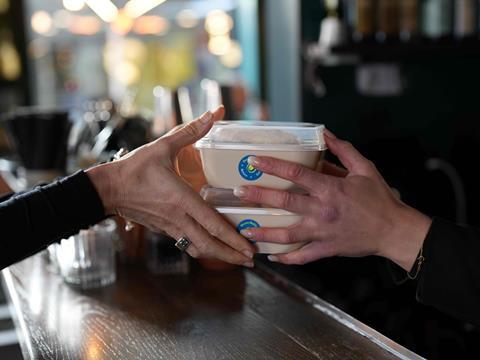
Berry Global has unveiled a range of stackable polypropylene bowls and lids intended to unlock reuse in foodservice applications and align with developing packaging legislation.
Aiming to make reuse easily accessible while meeting a range of needs in the foodservice industry, the bowls and lids are designed for interchangeable use. However, the lid half is transparent to display its contents, which is set to include full meals, fresh salads, snacks, and desserts.
The bowls are made of food-contact polypropylene, which is said to be easy to recycle. Intended for long-term durability, the bowls’ matt outer surface is said to be scratch-resistant, while the smooth inner surface claims to minimize the growth of bacteria for food preservation.
Stacking ribs have been implemented inside the bowls to make them stackable. This is set to save space in storage and transport and achieve easy handling for wait staff, allowing multiple portions of food to be served at once.
In turn, consumers can bring leftover food or takeaway meals home with them, then return the bowl and lid to the point of purchase to be reused. Each bowl comes with space for a QR code, barcode, Digimarc, or an RFID chip with a unique code to unlock wash cycle tracking, inventory management, and use in refill and deposit return systems. The lids can also be implemented with an RFID chip.
The range is compatible with industrial dishwashers. Berry has reportedly optimized the dishwasher cycle in terms of time and both energy and water usage.
In-Mould Labelling is also available to customize branding and decoration between food providers.
The tableware is designed as a response to increasing industrial and legislative action in pursuit of sustainability – such as the Anti-Waste Law for Circular Economy (AGEC) in France, which mandates reusable tableware for establishments containing seating for over 20 guests.
“We are delighted to introduce the game-changing Reusable Tableware product family which combines functionality, sustainability and advanced technologies,” said Josef Björk, VP CPI Food Service at Berry Superfos. “By choosing our reusable range, the food industry will minimize waste and reduce the use of virgin resources.
“Switching to reusable packaging presents a challenge for the food service industry, but it also offers a valuable opportunity. It allows the industry to rethink and streamline their operations, enhancing both efficient service and marketing prospects.
“The smart design of our Reusable Tableware Range has redefined the way restaurant food is served, enjoyed and packaged, providing foodservice professionals with multiple solutions that makes the range a practical and efficient choice for all their needs.”
In a similar development, CLUBZERØ revealed a new bowl and pot in a bid to package a range of foods in a returnable packaging system while reducing the consumption of single-use plastics.
Similarly, Graphic Packaging International and Picadeli’s snap-closing paperboard lid range are designed for its paper-based salad bowls and aim to cut 250 metric tons of plastic out of its supply chain every year.
If you liked this article, you might also enjoy:
The Lidl approach to packaging sustainability
How did Brazil achieve its 100% aluminium can recycling rate – and can it be replicated in the EU?
Experts have their say on the EU’s Packaging and Packaging Waste Directive revisions
A deep dive into the most important packaging sustainability trends and solutions














No comments yet